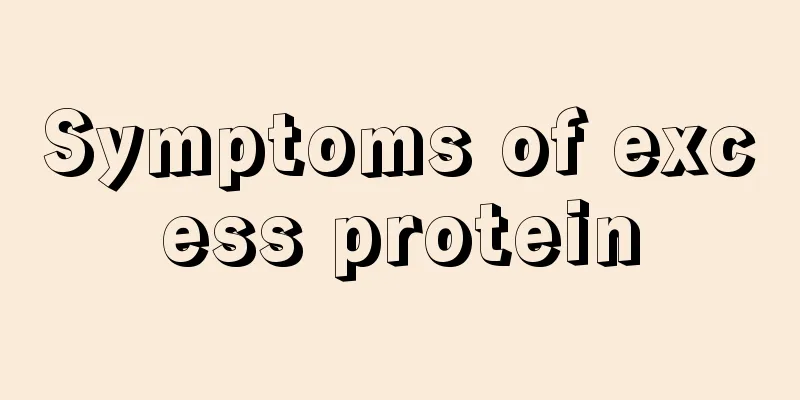Symptoms of excess protein

|
Protein is the basic component of the body and a substance that the body needs to replenish every day. Because the human body consumes huge amounts of protein, protein is the basis for providing energy to the body. Protein supplementation can make the body stronger, but some people blindly supplement protein, which can easily lead to protein excess problems. Let’s take a look at the symptoms of protein excess. Excessive intake of protein, especially animal protein, is also harmful to the human body. Excessive intake of animal protein will inevitably lead to more intake of animal fat and cholesterol. Too much protein itself can have harmful effects. Under normal circumstances, the human body does not store protein, so excess protein must be deaminated and the nitrogen is excreted from the body through urine. This process requires a large amount of water, which increases the burden on the kidneys. If the kidney function is not good, the harm will be even greater. Excessive intake of animal protein will also lead to excessive intake of sulfur-containing amino acids, which will accelerate the loss of calcium in the bones and easily cause osteoporosis. Symptoms of excess protein: When protein intake exceeds the required amount, a lot of toxic metabolic residues will remain in the human tissues after metabolism, causing autopoisoning, imbalance of acid and alkalinity (excess acidity), nutritional deficiencies (part of the nutrients are forced to be excreted), uric acid accumulation, and leading to various diseases such as gout. Patients with acute glomerulonephritis who consume too much protein will develop glomerular sclerosis. If you have renal insufficiency or azotemia, you should limit your protein intake (20 grams per day is appropriate) and consume high-quality protein, such as milk and eggs. Excessive protein will aggravate azotemia and uremia. To facilitate the repair and regeneration of liver cells, patients with liver disease need 90 to 100 grams of protein every day, but high protein should not be emphasized. Excessive protein intake will be converted into and stored as fat, which will increase the burden on the liver and lead to fatty liver. Indigestible protein will rot and ferment in the intestines, aggravating azotemia, ammonia poisoning and triggering hepatic coma. Excessive protein intake can also lead to brain damage, mental disorders, osteoporosis, arteriosclerosis, heart disease and other symptoms. People who eat high-protein food all year round will have harmful substances accumulate and be absorbed in the intestines, which may lead to premature aging and shortened life. |
<<: The process of ribosome protein synthesis
>>: The harm of protein deficiency in human body
Recommend
What are the causative factors of prostate cancer
There are many types of male diseases, and many o...
Progress in the treatment of prostate cancer
In fact, there have been great breakthroughs in t...
The dangers of taking a cold shower after exercise
Nowadays, more and more people like sports. Many ...
How to distinguish the authenticity of dried black wolfberry?
The health-preserving function of wolfberry is ve...
Can a virgin get uterine cancer?
Is it more likely for a virgin to get endometrial...
What are the methods for checking gastric cancer?
What are the methods for checking gastric cancer?...
What are the dangers of sitting for long periods of time? These consequences must be prevented!
The phenomenon of long-term sitting is quite comm...
Early prevention of cervical cancer
Cervical cancer is one of the most common maligna...
The difference between zucchini and raw melon
Zucchini and melon have the same scientific name ...
What are the typical symptoms of phv virus infection
Genital warts caused by HPV virus infection have ...
How to remove vertical lines between eyebrows
Vertical lines between the eyebrows are a type of...
What are the late symptoms of esophageal cancer?
When it comes to esophageal cancer, many people m...
Eight 3 minutes for a lifetime of health
With the continuous improvement of living standar...
The main cause of late-stage death in patients with esophageal cancer
Esophageal cancer is a malignant tumor of the dig...
Can advanced laryngeal cancer be treated?
Can advanced laryngeal cancer be cured? Laryngeal...









